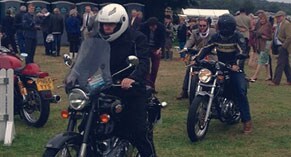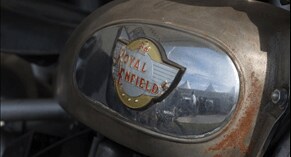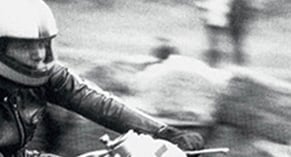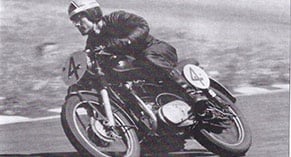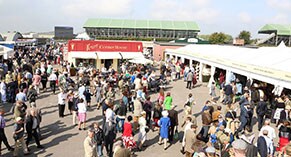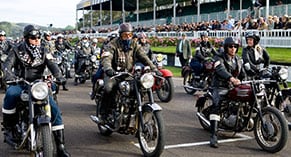Geoff Duke, who became one of the world's first motorcycling superstars, made his racing debut in 1948 in the Junior Isle of Man Grand Prix. He rode a 350cc Norton on loan from the factory. Although a split oil tank led to engine failure, causing him to withdraw from the race, he made a big impression because, at the end of the third lap, he was in first place. His first victory came in the 350cc class at the Haddenham Airfield circiut in 1949 shortly followed by wins in the Senior Manx Grand Prix and the Senior Clubman's TT later that year.
Geoff Duke, who became one of the world's first motorcycling superstars, made his racing debut in 1948 in the Junior Isle of Man Grand Prix. He rode a 350cc Norton on loan from the factory. Although a split oil tank led to engine failure, causing him to withdraw from the race, he made a big impression because, at the end of the third lap, he was in first place. His first victory came in the 350cc class at the Haddenham Airfield circiut in 1949 shortly followed by wins in the Senior Manx Grand Prix and the Senior Clubman's TT later that year.Duke significantly improved the image of motorcycling and motorcyclists in the 1950s. Charismatic, well-spoken and impeccably presented, he was voted Sportsman of the Year in 1951 - an unprecedented feat for a motorcycle racer - and awarded an OBE in 1953. During his short career, which ended prematurely with a crash when he was driving a Cooper Formula 1 car in Sweden in 1961, his riding prowess was second to none. He secured six world championships and six Isle of Man TT wins.
Arguably, his race record was even more impressive than the championship wins. Out of 66 Grand Prix starts, he won 33 races and finished on the podium a further 17 times. In 1955 he became the first rider to lap the Isle of Man TT circuit at 100 mph, although this was later downgraded to 99.97 mph. It is thought that this was due to the fact he rode a non-British motorcycle, an Italian Gilera, for this feat. Wearing a tailored all-in-one black leather racing suit (he is credited with developing the one-piece race suit) and pudding basin helmet, Duke had a silky smooth riding style. Stanley Woods, the renowned Irish racer, described Duke's technique as like "water flowing from a tap."
Duke joined Royal Enfield in 1964. His brief was to revitalise the company's image, with racing as a priority. His role was to help develop the GP5 250cc production racer, run an Enfield race team and generally endorse the whole Royal Enfield model range.
He was also involved with the development of the Continental GT. The bike was launched to great acclaim with a team of five riders thrashing it from John O' Groats to Lands End in a little over 22 hours. That's some achievement for a 250cc bike ridden at a time when motorways were in their infancy. Duke was scheduled to lap Oulton Park race circuit in the middle of the ride, but ice on the track halted that.
The development of the GP5 racer, in cooperation with legendary German 2-stroke wizard, Hermann Meier, and frame guru, Ken Sprayson of Reynolds, proved too expensive for the cash-strapped company. Although Percy Tait was timed riding one at 132 mph, just one year into the bike's development, and Selwyn Griffiths finished fourth in the Ulster Grand Prix, winning Enfield's only World Championship points, the company pulled the plug on the project and, effectively Duke's involvement with Royal Enfield. Only 20 complete GP5s rolled off the Redditch production line.
Geoff Duke died on 1 May 2015 aged 92. He'd lived on the Isle of Man since retiring from motorsport and had built several successful businesses there. Thousands of motorcyclists and racing fans lined the Snaefell Mountain Course to pay their last respects as the hearse carrying his coffin took the 'The Iron Duke' on one final lap of the famous TT course.
Throughout history, there have been several instances of motorcyclists who pledged themselves to turning the production Royal Enfields into successful racing machines. Royal Enfield historian, Gordon May, recounts the tales of legendary racing legends who often left the competition trailing behind.






